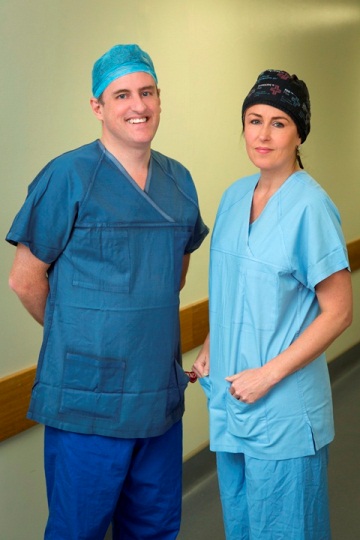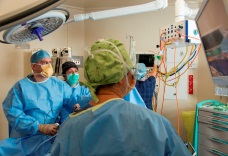Taking a team approach
This article originally appeared in our December 2014 St Andrew’s Best Practice Newsletter –
read the full issue here.
Teamwork is the word that comes up most in a conversation with Dr Lockie and his wife, Shirley Lockie (pictured). It is frequently mentioned as they describe the patient experience in their practice and also in describing their partnership with GPs who have patients considering bariatric surgery.

Dr Phil Lockie is an Upper GI and Laparoscopic Surgeon. Perioperative nurse surgical assistant, Shirley Lockie is the Clinical Co-ordinator for the practice and they are complemented by Psychologist, Michelle Van Vuuren and Dietician, Michelle Graham.
Co-ordinated by Shirley who acts as the first point of contact, patients will see each of the specialists in the practice. An approach that Dr Lockie argues has the best results (compared with surgery alone), particularly when looking at 18 months post-surgery and beyond.
Dr Lockie trained mainly in the UK before completing an Upper GI Fellowship at Royal North Shore Hospital in Sydney which was followed by a Laparoscopic Surgical Fellowship in Canberra. He specialises in laparoscopic and minimally invasive surgery of the abdomen and gastrointestinal tract.
The most common procedure for patients is a Laparoscopic Sleeve Gastrectomy which reduces the stomach volume by around 80 per cent. Dr Lockie explains that:
“This allows patients to have a much more normal relationship with food. They can eat most things but through eating smaller portions, patients can see 65 per cent more excess weight loss.”
However, it is the care before and after the procedure that is just as important as the procedure itself.
“In some ways, the surgery is the easy part. It’s a couple of days in hospital and it’s not very sore. The key to success is making lifestyle changes.” Dr Lockie explains.
“On average, patients are thinking of surgery for 18 months prior to starting the process and they commonly know quite a lot about the process itself. Meeting with a psychologist and dietician ensures a more rounded knowledge and a more informed decision.”
Shirley Lockie spent 15 years in theatre nursing then retrained as a perioperative nurse surgical assistant.
“
Patients spend a lot of time with the surgeon, getting clinically assessed straight away.” Shirley said.
“That gives them time to consider if the surgery is really what they want to do. It’s also a pay as you go system so patients are not locked in from the start.”
Surgery on morbidly obese patients can involve significant risks requiring a particular focus on preoperative investigations. Obstructive sleep apnoea, hypertension and diabetes as well as stomach ulcers or hiatus hernia are particular concerns and patients may require a sleep study, gastroscopy to check for stomach ulcers or hernia and an anaesthetist consultation / assessment to check for additional risk factors.
Psychologist Michelle van Vuuren explains that her job is to help patients develop skills to get the most from the surgery. The focus is on identifying strategies related to their individual strengths and weaknesses to enable them to maintain the weight loss results. She comments:
“Most patients have done a lot of research on the surgery itself and for many it can be a relief to talk about the psychological aspects in a supportive environment.”
Michelle also runs a support group as part of the post operative patient care and describes this as a reciprocal relationship for the patients – both giving and receiving support.

Dr Lockie says it can be easy to see bariatrics simply as weight loss surgery but he prefers to look on it as co-morbidity surgery:
“My message for GPs is to send patients early, don’t see it as a last resort and also consider co-morbidities.”
He explains that a significant number of patients see their type two diabetes resolved after bariatric surgery. Weight loss can also have a positive impact on high blood pressure, sleep apnoea and arthritis (especially knee pain). Going further, he highlights growing evidence of links between cancer and obesity. For example colon cancer in men and poorer results in breast cancer treatment for obese women as well as proven links to renal cancer and oesophageal cancer.
Again the teamwork theme emerges as Dr Lockie explains:
“We engage with our GPs and want to work with them. Our hypertension and diabetes patients are usually very well cared for by their GPs and the post operative monitoring for those patients is very important.”
North West Medical Centre
125 Flockton Street
Everton Park QLD 4053
T 07 3353 2011
E info@drphillockie.com.au
W
www.drphillockie.com.au